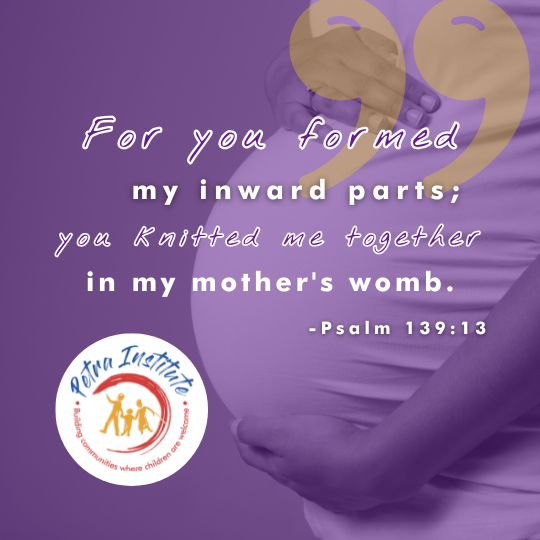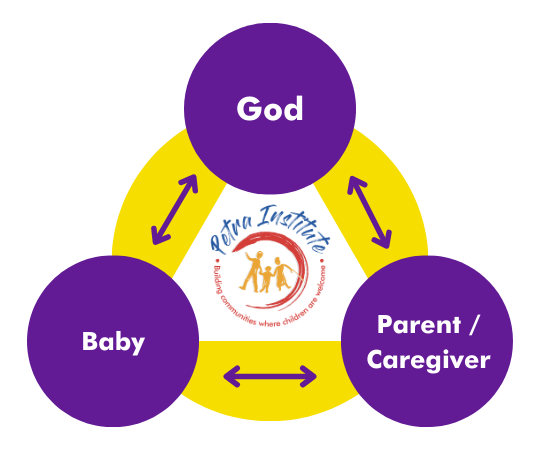.jpg)
SPIRITUALITY IN THE FIRST 1000 DAYS
Nurturing Souls from the Very Beginning
The term “First Thousand Days of Life” has gained prominence through the work of organisations such as The Lancet Medical Journal, UNICEF, and the World Bank. This period, from conception to a child’s second birthday, is widely recognised as critical for physical, emotional, and cognitive development (Shonkoff & Phillips, 2000).
But what is spiritual development?
Healthy nutrition, quality medical care, and supportive socio-emotional care for both mother and baby during this window influence not only survival but also the child’s capacity to grow, learn, and thrive. In the long term, it contributes to the health, stability, and prosperity of society.
Government bodies, NGOs, and churches have addressed various aspects of this developmental stage. However, the area of spiritual development receives limited attention.
This blog explores how Christian spirituality recognises babies as relational beings from conception, already connected to God and others, and how caregivers and communities can nurture this early spirituality.
Biblical Foundations: Babies as Relational Beings from Conception

The Bible affirms the personhood and relational nature of babies from the very moment of conception. Psalm 139:13–16 (NIV) says:
“For you created my inmost being; you knit me together in my mother’s womb. I praise you because I am fearfully and wonderfully made.”
The psalmist recognises God’s intimate involvement in the formation of the unborn child. This suggests that personhood and relationship begin before birth.

In Jeremiah 1:5 (NIV), God declares:
“Before I formed you in the womb I knew you, before you were born I set you apart.”
This verse indicates that the divine relationship and purpose for a child begin before birth. Likewise, in Luke 1:41–44, John the Baptist, still in the womb, leapt at the sound of Mary’s greeting. He recognised the presence of the unborn Jesus, showing spiritual sensitivity and relational response in utero.
Created in the Image of God: The Relational Nature of Human Beings
A biblical worldview maintains that all humans are created in the image of God (Genesis 1:26–27). This image includes relationality, as God exists eternally in relationship within the Trinity: Father, Son, and Holy Spirit. Therefore, babies are not only physical beings but inherently spiritual and relational from conception (Balswick, King, & Reimer, 2016).
Developmental psychology supports this theological view. Bowlby (1969) demonstrated that infants are biologically wired for attachment, while Miller (2015) argues that infants are innately open to spiritual experiences, capable of sensing the Divine.
Relationship with God and Caregivers
From conception, a child is engaged in two primary relationships:
1. Vertical Relationship with God:
Psalm 139 and Jeremiah 1 indicate that God is present and active in the child’s life even before birth. The soul of the child responds to God’s presence long before they are capable of conscious thought.
The caregiver has also been in a relationship with God since conception. This relationship may evolve through different seasons and could even become negative. The connection between God and the caregiver may affect their relationship with the baby and can influence the baby’s future relationship with God.
2. Horizontal Relationship with Caregivers:
The relationship between a baby and their caregivers mirrors and mediates God’s love.
Jesus said,
“Whatever you did for one of the least of these brothers and sisters of mine, you did for me.” (Matthew 25:40).
Attachment theory confirms this idea. Secure attachment, created through consistent and loving care, forms a foundation for spiritual understanding by helping the child perceive God as trustworthy and loving (Granqvist & Kirkpatrick, 2008).

Nurturing a Baby’s Spirituality: Responsive Care and Interaction with Nature
The spirituality of infants can be nurtured intentionally through two primary avenues: acts of service and interaction with nature.
1. Responsive Caregiving
Jesus modelled servant leadership and called His followers to do the same (John 13:14–15). When parents and caregivers provide responsive care through feeding, comforting, speaking, playing, and cuddling, they embody God’s nurturing love. This kind of care offers infants a tangible experience of grace, safety, and unconditional love, shaping their earliest understanding of who God is (Coe, 2011).
Theologically, this reflects the parental role described in Deuteronomy 6:6–7:
“These commandments that I give you today are to be on your hearts. Impress them on your children. Talk about them when you sit at home and when you walk along the road, when you lie down and when you get up.”
Even if a child cannot yet understand words cognitively, the emotional and relational environment in which they are raised communicates God’s love and truth in powerful, nonverbal ways.
2. Interaction with Nature as Spiritual Formation
Romans 1:20 (NIV) states:
“For since the creation of the world God’s invisible qualities—his eternal power and divine nature—have been clearly seen, being understood from what has been made.”
Nature serves as a sanctuary where even infants can encounter God. Walking outdoors, exposure to natural light, animals, and the beauty of creation can stimulate a baby’s senses and foster a sense of awe.
According to Louv (2008), interaction with nature contributes to children’s emotional and cognitive well-being, as well as their spiritual development. Furthermore, nature reflects God’s provision and creativity, inviting caregivers to introduce infants to gratitude and wonder from an early age. Simple practices, such as thanking God for flowers, birds, or rain during walks, can lay a spiritual foundation.
The Role of the Church and Faith Communities
Faith communities play a vital role in supporting the spiritual well-being of infants and their families during the First 1000 Days. Baptism or child dedication ceremonies affirm the child’s belonging to God and the community’s shared commitment to nurture their faith (Matthew 19:14).
Congregations can offer meaningful support to parents through:
- Parenting classes that include a spiritual foundation
- Intergenerational worship where babies participate in communal faith practices
- Support groups for new parents, fostering both spiritual and emotional resilience
These expressions of care help create environments where even the youngest members are spiritually welcomed and formed.
Implications for Christian Parenting and Ministry
Recognising the spiritual nature of infants requires a paradigm shift in how Christian parents and ministries approach early childhood. This perspective calls for intentional practices that nurture the whole child:
- Holistic care that addresses physical, emotional, and spiritual needs together
- Intentional formation by incorporating prayer, worship, and Scripture into daily family rhythms
- Faith modelling, where parents' own spiritual lives profoundly influence their children (Bandura, 1977)
- Secure attachments, formed through consistent, loving care that reflects God's steadfast love (Lamentations 3:22–23)
By embracing these principles, parents and faith communities can lay a strong spiritual foundation from the very beginning of life.
Shaping Souls from the Start: Partnering for Impact
The First 1000 Days of life are sacred. Children are not only growing physically and emotionally but are also beginning their spiritual journey. Christian spirituality, rooted in Scripture and supported by developmental science, encourages believers to nurture this emerging spirituality through acts of loving service and meaningful encounters with God’s creation. In doing so, caregivers undertake the sacred responsibility of shaping souls for a lifetime of faith.
How we support this journey:
At Petra Institute, we work with churches, schools, and organisations around the world to equip leaders for relational children’s ministry from the very start.
Our course, God, My Baby, and I: The First 1000 Days, is designed to help caregivers and leaders understand how to nurture a baby’s faith from conception through responsive care and spiritual attentiveness.
How can we join hands with your church, organisation, or school?
Petra Institute has trained participants in more than 80 countries. Our approach is rooted in Biblical values, shaped through practical experience, and sustained through long-term partnerships.
We help communities deepen their understanding of God’s heart for children and design strategies to empower parents, leaders, and churches to nurture faith intentionally, starting from conception.
FIND OUT HOW TO PARTNER WITH US
#
BIBLIOGRAPHY
- Balswick, J. O., King, P. E., & Reimer, K. S. (2016). The Relational Soul: Moving from False Self to Deep Connection. IVP Books.
- Bandura, A. (1977). Social Learning Theory. Prentice-Hall.
- Bowlby, J. (1969). Attachment and Loss: Volume I. Attachment. Basic Books.
- Coe, J. H. (2011). “A Theology of Child Development.” In The Handbook of Spiritual Development in Childhood and Adolescence, ed. E. C. Roehlkepartain et al., Sage.
- Granqvist, P., & Kirkpatrick, L. A. (2008). “Attachment and Religious Representations and Behavior.” Advances in the Psychology of Religion, 4, 141-162.
- Louv, R. (2008). Last Child in the Woods: Saving Our Children from Nature-Deficit Disorder. Algonquin Books.
- Miller, L. (2015). The Spiritual Child: The New Science on Parenting for Health and Lifelong Thriving. St. Martin’s Press.
- Shonkoff, J. P., & Phillips, D. A. (Eds.). (2000). From Neurons to Neighborhoods: The Science of Early Child Development. National Academy Press.
- The Holy Bible, New International Version (NIV).








